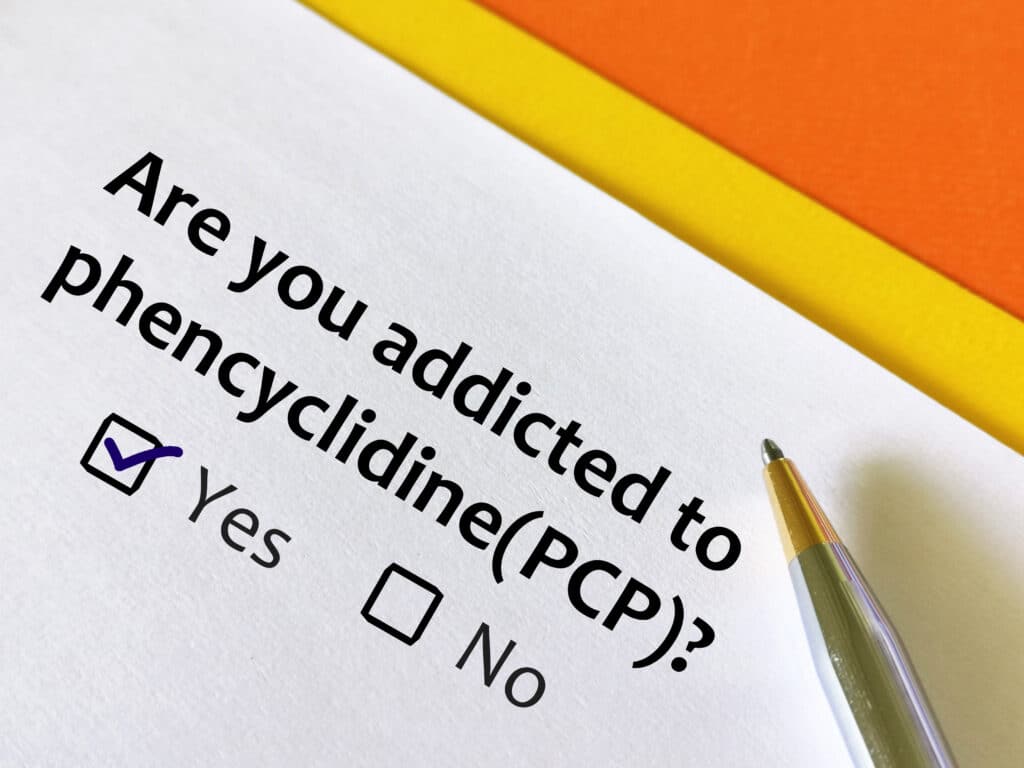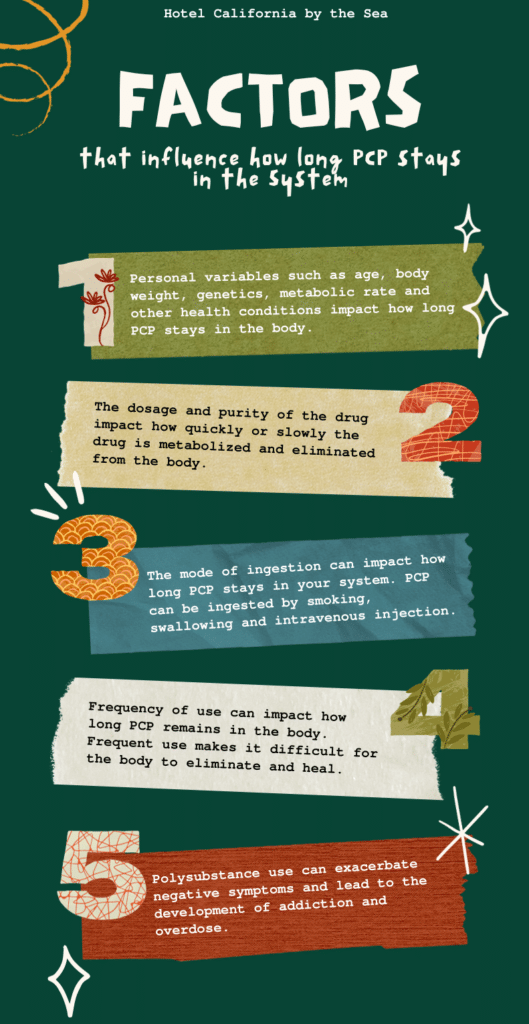How long does PCP stay in Your System?
Phencyclidine, more commonly known as PCP, is a synthetically derived hallucinogenic substance that is derived from the chemical 1-phenylcyclohexylpiperidine hydrochloride. It is a highly addictive and potentially dangerous drug. According to the American Association of Poison Control Centers, the National Poison Data System reported an estimated 546 cases mentioning PCP in 2020. From 2019 to 2020, the National Survey on Drug Use and Health reported an increase from 30,000 to 52,000 people aged 12 and older initiating PCP use. This substance gained popularity in the 1960s as a club drug but was originally developed as an intravenous general anesthetic. Primarily used among young people, PCP is a powerful substance with a high potential for dependence and addiction.

PCP is a Schedule II Controlled Substance that looks like a crystalline white powder that is water and alcohol-soluble. It can be smoked, swallowed, snorted or injected. PCP is also known by other names such as elephant tranquilizer, horse tranquilizer, embalming fluid, rocket fuel or angel dust. This drug produces dissociative effects that act on the central nervous system altering mood, behavior and the way in which a person relates to their environmental surroundings. Users describe PCP as the sensation of floating, disconnected from reality and euphoria without inhibitions.
How does PCP work? PCP affects multiple neurotransmitters in the brain. It can inhibit the reuptake of dopamine, norepinephrine and serotonin. This allows for more of these chemicals to be available for use resulting in a pleasurable sensation, euphoria high and even bizarre sensory experiences. PCP can also inhibit the actions of glutamate by disrupting NMDA receptors responsible for pain sensations, emotions, learning and memory functions. When the drug interrupts these receptors, it allows the brain to disconnect from the normal sensory experiences and blurs the lines of reality.

How long does PCP stay in the System?
PCP is a hallucinogenic drug that has a half-life of about 3 days. So how long does PCP stay in your system? The effects of PCP can begin within minutes and last up to 4-6 hours with lingering effects for up to 7 days. In drug tests, the detection of PCP can vary. In a urine test, PCP can be detected within 4-6 hours and can continue to be detected for up to 4 weeks after initial use. In a blood test, PCP can be detected within 1-4 hours and can test for up to 24 hours. In a saliva test, PCP can be detected within 5-10 minutes and for up to 10 days after.
In some research, studies have found it can take between 1-10 days to eliminate PCP from your system fully. Other research claims that because PCP is stored in the lipid fat structures of the body, it acts on a slow release. Meaning it can take up to 17 days to be removed from the body.
There are many factors that can influence how long PCP stays in your system. These factors include individual variables, dosage and purity, modality of administration, frequency of usage and concurrent use of other substances.
- Individual Factors – Personal variables such as age, body weight, food intake, hydration, genetics, metabolic rate and other health conditions impact how long PCP stays in the body.
- Dosage and Purity – The drug dosage and drug purity can impact how quickly the drug is metabolized and secreted from the body. A greater dose or a more potent dose will take longer to leave the system. PCP is a difficult drug to synthesize and as a result, street formulations are different and can vary in concentration and potency.
- Mode of ingestion – PCP can be ingested orally, through smoking, intravenous injection or intranasal insufflation. When smoked, snorted or injected intravenously, PCP effects can begin within 2-5 minutes and peak around 15-30 minutes. When swallowed, PCP effects can start within 30 minutes and peak between 2-5 hours.
- Frequency of Use – Consistent use can lead to tolerance and dependence. This makes it more difficult for the body to eliminate the drug if it constantly has to break down more and more.
- Concurrent use of other Substances – Polysubstance use can lead to the development of an addiction and overdose.
Check Your Insurance Coverage for FREE
Find out if your insurance covers addiction treatment in minutes. We accept most insurance!
The effects of PCP
PCP has the ability to alter a person’s state of consciousness. It causes psychological effects that can be unpredictable, which can also lead to dangerous physical effects. In low doses, PCP can create a sense of euphoria making the user feel like they are floating away from their physical bodies. Large and increased doses will lead to more intense symptomatic feelings as well as hallucinations and erratic behaviors. With long-term use, PCP affects the ability to retain memory, process emotion and the ability to learn.
Hallucinogen Persisting Perception Disorder (HPPD) is a long-term side effect that is often seen in long-time users of PCP. It is characterized by the development of persistent speech problems like stuttering, having difficulty articulating and the inability to speak. It can also lead to severe signs of depression, flashbacks and toxic psychosis. Toxic psychosis is the development of hostility, paranoia and delusions. These symptoms can persist for up to a year after initial PCP use. In those who experience flashbacks and hallucinations, these feelings can linger on for long after PCP use has stopped.
- Hallucinations
- Sense of euphoria
- Perceptions of superhuman strength
- Excitement
- Lack of pain
- Symptoms of anxiety and panic
- Confusion and delusions
- Paranoia and agitation
- Suicidal thoughts
- Dissociation and feeling disconnected from mind and body
- Trouble concentrating
- Blurred vision
- Difficulty speaking
- Impaired motor skills
- Slowed breathing
- Increased body temperature
- Rapid eye movement
- Nausea and vomiting
Signs of PCP Addiction
- Using PCP in greater amounts for longer periods of time
- Repeated, unsuccessful attempts to cut back or quit using PCP
- Spending large amounts of time obtaining PCP, using PCP or recovering from the use of PCP
Interactions with other Substances
When interacting with other central nervous system depressants such as alcohol or benzos, PCP can lead to symptoms of severe sedation. This could eventually lead to respiratory depression and coma. Because it was known as a club drug, PCP was often mixed with other drugs like ecstasy, meth and LSD. Polydrug use is most commonly found in young people. It has even become popular to soak cigarettes in a yellow PCP liquid to smoke and experience the effects of the drug. Young people are also at a much higher risk of developing lasting side effects such as psychosis later on in life if they are abusing PCP.
Reach out to Hotel California by the Sea
We specialize in treating addiction and other co-occurring disorders, such as PTSD. Our Admissions specialists are available to walk you through the best options for treating your addiction.
Hotel California by the Sea provides professional substance use disorder treatment to people from all walks of life. Various levels of care including detox, residential and outpatient programs provide the support and knowledge clients need to address every aspect of their addiction. Rigorous treatment methods including medication management, cognitive behavioral therapy and dialectal behavioral therapy are important in treating substance addiction. Hotel California by the Sea also utilizes unique treatments such as family therapy and EMDR therapy. These specialized techniques help clients further address any underlying co-occurring mental health conditions that are affecting their addiction.
References:
https://www.addictioncenter.com/drugs/how-long-do-drugs-stay-in-your-system/
https://www.healthline.com/health/pcp
https://medlineplus.gov/ency/patientinstructions/000797.htm
https://www.deadiversion.usdoj.gov/drug_chem_info/pcp.pdf
https://www.addictioncenter.com/drugs/hallucinogens/pcp-phencyclidine/
https://www.ncbi.nlm.nih.gov/pmc/articles/PMC2859735/
https://www.medicalnewstoday.com/articles/305328
https://www.addictiongroup.org/drugs/illegal/pcp/system/
https://mentalhealthdaily.com/2015/10/15/how-long-does-pcp-stay-in-your-system-phencyclidine/
https://drugfree.org/drugs/what-is-pcp/
